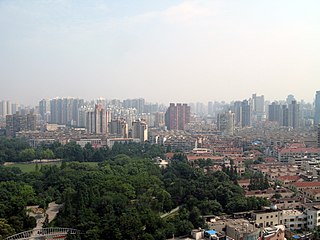The Shanghai Drug Abuse Treatment Centre, or SDATC (simplified Chinese :上海市自愿戒毒医疗康复中心; traditional Chinese :上海市自願戒毒醫療康復中心; pinyin :Shànghǎishì Zìyuàn Jièdú Yīliáo Kāngfù Zhōngxīn), is a governmental organization providing drug abuse treatment and rehabilitation services in Shanghai, China. SDATC is the only government-supported centre in Shanghai and was established in 1997 on the approval of Shanghai Narcotic Control Commission and Shanghai Public Health Bureau. [1]

Simplified Chinese characters are standardized Chinese characters prescribed in the Table of General Standard Chinese Characters for use in mainland China. Along with traditional Chinese characters, they are one of the two standard character sets of the contemporary Chinese written language. The government of the People's Republic of China in mainland China has promoted them for use in printing since the 1950s and 1960s to encourage literacy. They are officially used in the People's Republic of China and Singapore.

Traditional Chinese characters are Chinese characters in any character set that does not contain newly created characters or character substitutions performed after 1946. They are most commonly the characters in the standardized character sets of Taiwan, of Hong Kong and Macau, and in the Kangxi Dictionary. The modern shapes of traditional Chinese characters first appeared with the emergence of the clerical script during the Han Dynasty, and have been more or less stable since the 5th century.
Hanyu Pinyin, often abbreviated to pinyin, is the official romanization system for Standard Chinese in mainland China and to some extent in Taiwan. It is often used to teach Standard Mandarin Chinese, which is normally written using Chinese characters. The system includes four diacritics denoting tones. Pinyin without tone marks is used to spell Chinese names and words in languages written with the Latin alphabet, and also in certain computer input methods to enter Chinese characters.
Contents
SDATC is one of the departments of Shanghai Mental Health Center (SMHC), which is one of the largest and more comprehensive mental health institutions in China. [1] SMHC has multi-functions including prevention, clinical, teaching and training, research, supervision, etc.
Shanghai Mental Health Center, also known as Shanghai Psychological Consultative Center, is a hospital in Shanghai focusing on treating mental disorders. It was founded in 1935, as Puci Rehabilitation Hospital. It was formerly called Shanghai Psychiatric Hospital. Since May 2006, the hospital has been affiliated to School of Medicine of Shanghai Jiao Tong University.
Mental health is a level of psychological well-being or an absence of mental illness - the state of someone who is functioning at a satisfactory level of emotional and behavioural adjustment". From the perspectives of positive psychology or of holism, mental health may include an individual's ability to enjoy life, and to create a balance between life activities and efforts to achieve psychological resilience. According to the World Health Organization (WHO), mental health includes "subjective well-being, perceived self-efficacy, autonomy, competence, inter-generational dependence, and self-actualization of one's intellectual and emotional potential, among others." The WHO further states that the well-being of an individual is encompassed in the realization of their abilities, coping with normal stresses of life, productive work and contribution to their community. Cultural differences, subjective assessments, and competing professional theories all affect how one defines "mental health".












